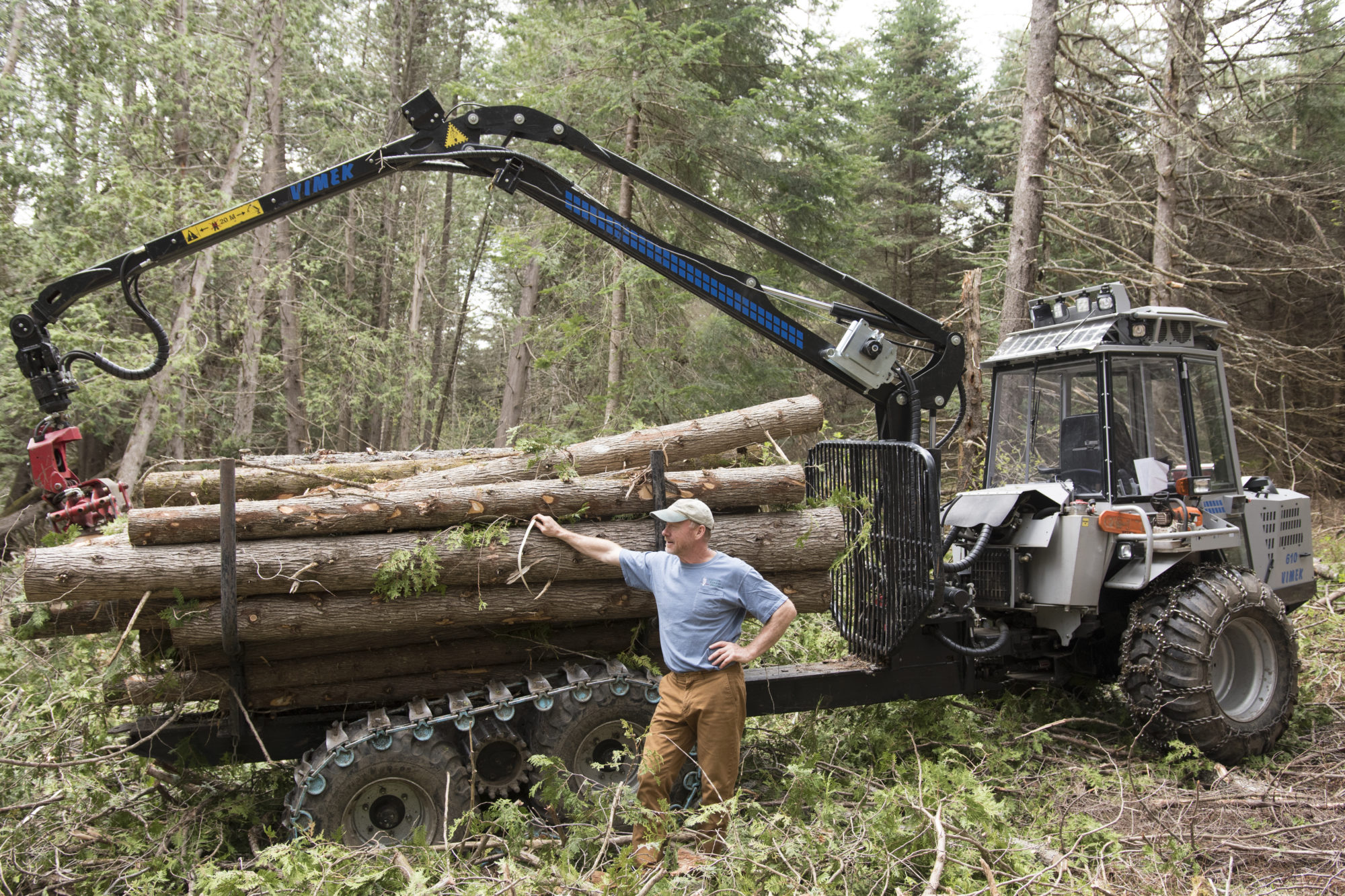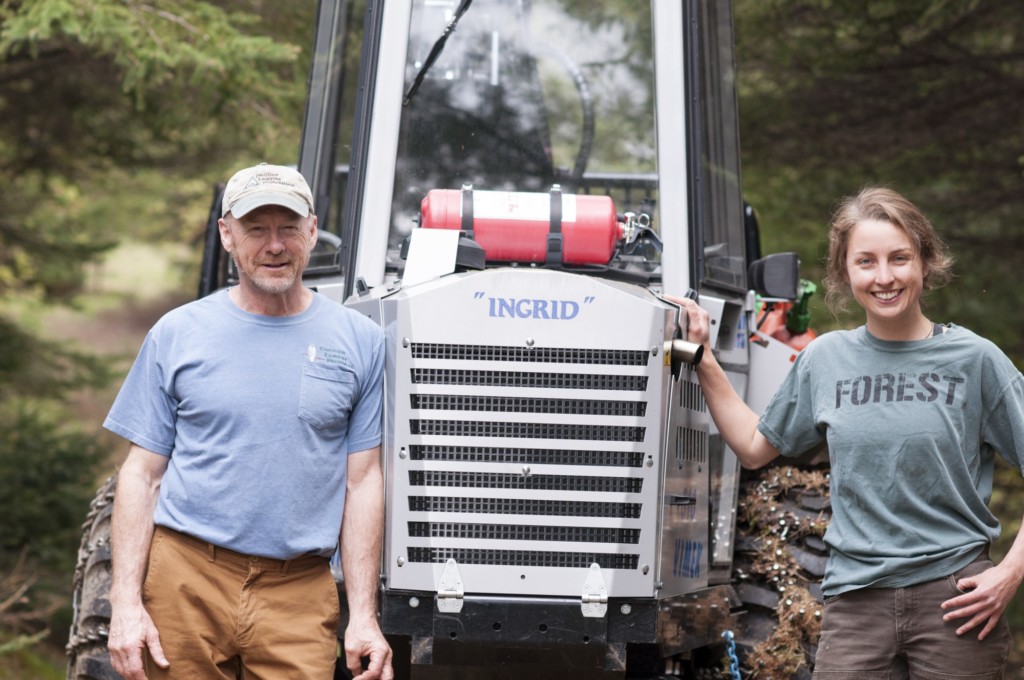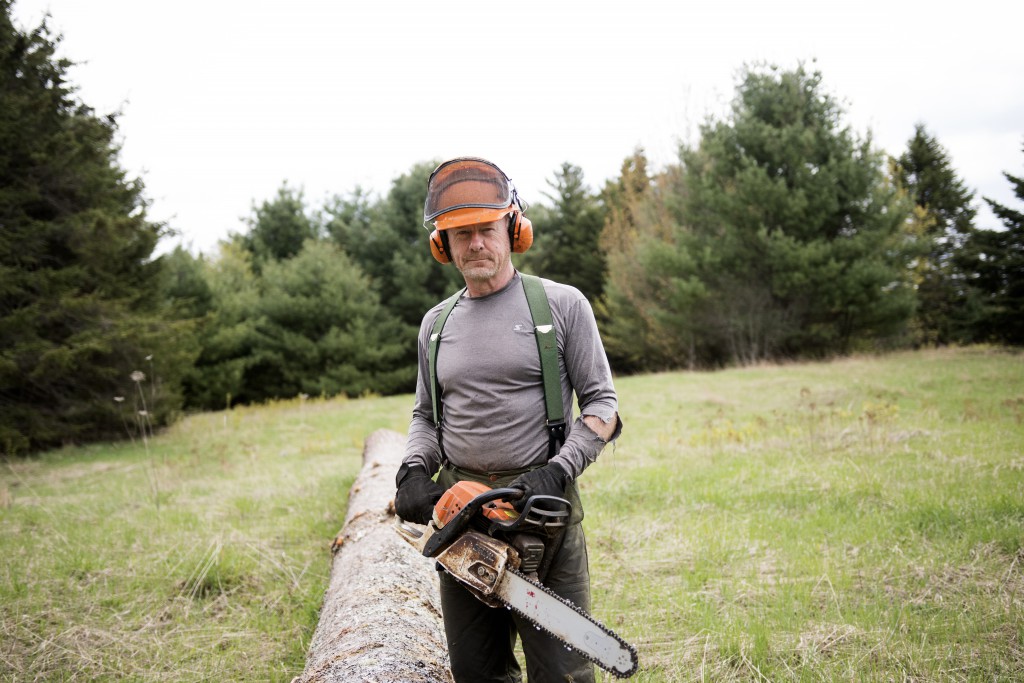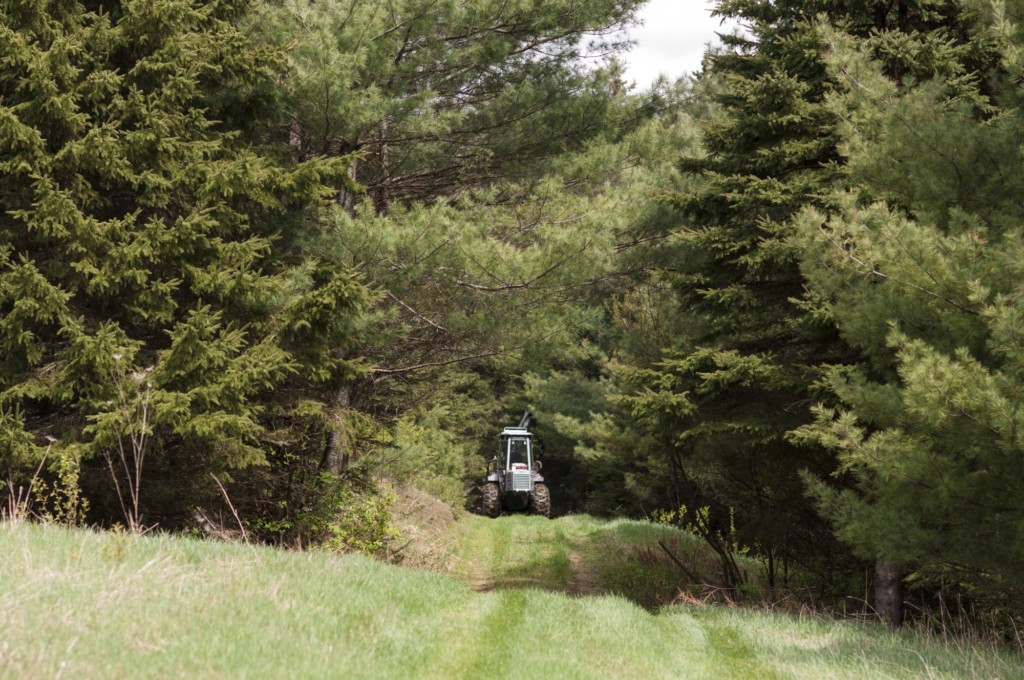Joel Currier and His Forwarder, Ingrid
May 22, 2018

By Christine McGowan, Forest Program Director, Vermont Sustainable Jobs Fund
Northeast Kingdom logger models responsible forestry with small-scale, low-impact logging.
“Good forestry equipment does not have to be big and heavy,” says Joel Currier, owner of Currier Forest Products in Danville, Vermont. “There are big operations doing good work in Vermont, but for my purposes Ingrid is the right size and has much less impact on the forest floor.”
Ingrid, named after the Swedish beauty Ingrid Bergman, is a Vimek 610 forwarder that Joel brought over from Sweden. Smaller and lighter than traditional logging equipment, Ingrid allows Joel to selectively harvest trees with minimal damage to the surrounding forest, part of his family’s commitment to sustainable forestry practices.
Responsible forestry on a working landscape
“I’m the fifth generation to work this farm,” says Joel, “and my son and daughter are the sixth. Modeling sustainable behavior in all that we do is our mission and our legacy.” This commitment led Joel to Elmia Wood, the world’s largest forestry fair, in Sweden more than a decade ago. The “live” fair invites professionals from all over the world to see new technologies and innovations in forestry at work on a 131,000 sq.m demonstration area. In between the all-terrain logging trucks and new harvester machines, Joel discovered Ingrid, a relatively light forwarder. “She doesn’t quite walk on water,” said Joel, “but at 12,000 vs. 60,000 pounds, she has much less impact on the forest floor.”
That lighter touch suits Currier Forest Products in more ways than one. In addition to allowing for more selective cutting, Ingrid enables Joel to work his 500-acre forest year round. Most logging happens in the winter months when the ground is frozen to minimize damage and erosion, but with Ingrid, Joel can work in the woods in any season. “She can even harvest cedar stands in wet areas in April and May,” said Joel.

Joel Currier and UVM senior Lucy Labadie stand next to Ingrid in Danville. Photo credit: Erica Houskeeper
His approach to logging appealed to Lucy Labadie, a senior at UVM majoring in Environmental Studies with a minor in forestry, for whom Joel has become an unofficial mentor. “Land conservation can only succeed when we understand the people who depend on the land to make a living,” said Lucy. “It’s inspiring to work with someone like Joel, who depends on the forest for his livelihood and understands the deep importance of good stewardship. The use of low-impact logging equipment like the Vimek 610 forwarder is not a small investment, but he knows he is doing right by his forest. His clientele understands that good logging practices go hand in hand with sustainable forestry.”

Joel Currier is the fifth generation to work on the farm. Modeling sustainable behavior is Currier’s mission and legacy. Photo credit: Erica Houskeeper
Finding niche markets for small scale logging
While Ingrid’s size and capabilities may not work for larger-scale logging operations, Joel has found a niche market supplying long timbers, up to 60 feet long, for restoration projects in Vermont and New England. “When a town is restoring a meeting house or covered bridge, they often need long timbers that are historically in line with what would have been used 100 years ago. We can provide locally harvested 60 foot pine, spruce or hemlock logs that will preserve the historical integrity of the project.” Joel points to the schooner, Lois McClure, a replica of the 1862 canal boats that traversed Lake Champlain in the 19th century, as another example. Currier Forest Products provided the masts for the boat back in 2004. They also supply wood for timber framing and to local luthiers for making violins and guitars.
In addition, Joel has discovered a market in Vermont for small-scale, low impact clearing. This spring, Joel partnered with UVM to work with a graduate student studying forest resiliency and climate change. Working with the director of forestry at UVM, Joel brought Ingrid in to clear nine plots, each 110 feet in diameter. UVM will be planting 12 warmer climate species in these plots to study their viability in Vermont over the next 50 years. “Ingrid was perfect for this job,” said Joel. “We cleared the areas without having to bring in a grapple skidder, which would have required a much broader stroke. Small is still beautiful.”
Joel makes a point to note that machines like Ingrid won’t work for every situation, but also that there are a number of loggers in Vermont experimenting with smaller scale machinery. “It depends on the county and the landowner’s vision for the forest,” he said. “Everyone sees something different when they walk through a forest. Some see tables, others wildlife habitat. Some see trails, while others see timber. Vermont forests provide all kinds of products and experiences, and they can be managed to meet all of those needs if we are deliberate in our management and open to new ways of doing things.”

Joel Currier and his forwarder, Ingrid, on Currier’s Danville property. Photo credit: Erica Houskeeper
Vermont Forest Industry Network
The Working Lands Enterprise Board Forestry Committee and the Vermont Sustainable Jobs Fund will host the First Annual Vermont Forest Industry Summit on June 28-29 at Burke Mountain Resort. Vermont’s forest products industry generates an annual economic output of $1.5 billion and supports 10,000 jobs in forestry, logging, processing, specialty woodworking, construction and wood heating. The new Vermont Forest Industry Network creates the space for industry professionals from across the entire supply chain and trade association partners throughout the state to build stronger relationships and collaboration throughout the industry, including helping to promote new and existing markets for Vermont wood products, from high quality furniture to construction material to thermal biomass products such as chips and pellets. For more information please visit www.vsjf.org.
Lead Photo: Ingrid is a forwarder, a low-impact machine that allows Joel to selectively harvest trees with minimal damage to the surrounding forest, part of his family’s commitment to sustainable forestry practices. Photo credit: Erica Houskeeper




